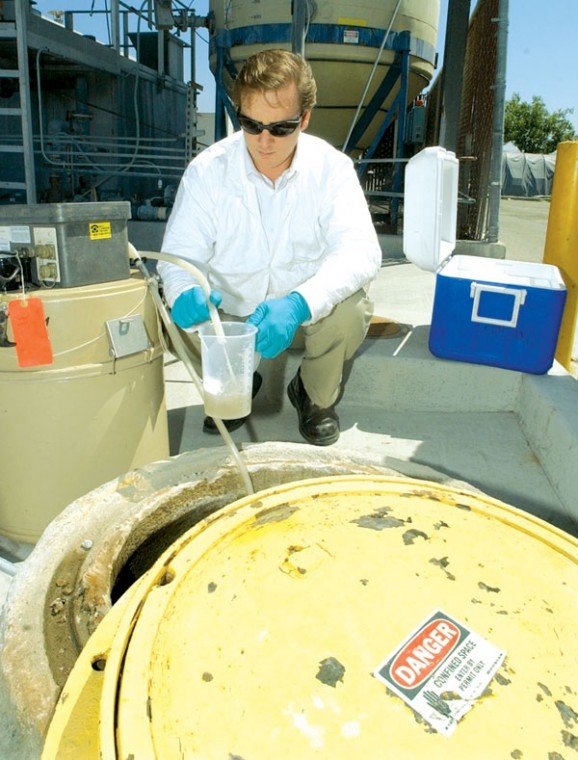Gilroy
– Businesses throughout the state cope with a myriad of
paperwork and inspections, especially when a single hazardous
chemical is involved. And in most parts of California, that means
answering to three or more agencies.
Gilroy – Businesses throughout the state cope with a myriad of paperwork and inspections, especially when a single hazardous chemical is involved. And in most parts of California, that means answering to three or more agencies.
But businesses in Gilroy have a different experience, one that the city’s four chemical control specialists like to call “one-stop shopping.”
Gilroy is one of a handful of cities throughout the state that is certified to handle its own monitoring of businesses that use, store, or release hazardous chemicals into the city’s sewer system. The list of several hundred businesses under the purview of the city’s Certified Unified Program Agency, or CUPA, include dry cleaners, gas stations, wood shops, even Gilroy’s own government agencies.
“It’s really a big benefit to the community because they only have to deal with one set of inspectors,” said Jackie Brettschneider, the city’s fire marshal and overseer of the CUPA and industrial wastewater programs.
The city is just one of about four or five agencies in California that conducts its own hazardous waste monitoring, according to Brettschneider. Santa Clara County and the city of Santa Clara also are on the list.
Jonathan Crick is the member of the four-man team that specializes in industrial wastewater. He routinely inspects any businesses in Gilroy and Morgan Hill that discharge into the cities’ shared sewer system.
On an inspection visit to Cintas, an industrial dry cleaner in Gilroy that releases 10,000 gallons of wastewater per day, Crick tests for heavy metals, grease, pesticides, solids, even temperature. Wastewater that is too hot can kill natural organisms that break down wastes at the regional sewer plant, Crick explained.
“If a business doesn’t meet all the parameters, they have to take corrective action,” he added. “If a particular machine is down, for example, they’d have to replace it.”
He and the other chemical control specialists are not just inspectors, but enforcers as well.
They have the power to issue notices of violation and fine businesses up to $1,000 for failure to correct problems.
In the most extreme cases, they can “red tag” a site and prevent vendors from supplying the business.
“We can effectively shut down the business,” said Miguel Trujillo, one of three chemical control specialists who focus on hazardous materials use and storage. He said the city came close to “red-tagging” a Monterey Street gas station in the last year. The station had not spilled gas or caused other environmental damage, but had consistently failed to file inspection reports and other mandated paperwork. Trujillo said they avoided closing the business by holding an enforcement hearing, which led to the gas station paying $7,000 in fines and filling out the appropriate paperwork.
Of the 200 businesses in the hazardous materials program, about half received minor violations last year that were quickly resolved, according to Trujillo.
“Ninety-five percent of people want to comply,” he said. “It’s just that five percent we have to work with a little more.”
The inspectors themselves are not beyond scrutiny. At least every three years various state agencies and the federal Environmental Protection Agency audit the city’s CUPA program. Staying on top of procedures requires constant training for all the chemical control specialists.
“The laws are complex and always changing,” Trujillo said, “so we have to keep up.”














